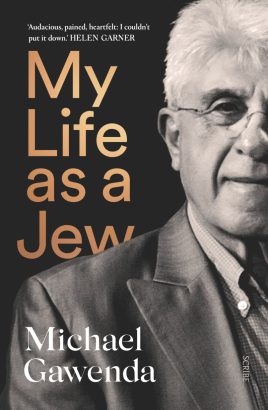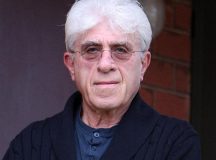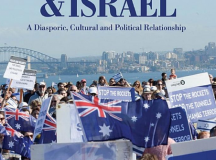Michael Gawenda is a well-known Australian journalist. He was editor of the centre-left Melbourne Age for seven years from 1997-2004, and additionally worked at Time Magazine, and as a foreign correspondent in both London and Washington. As signified by the title of this book, he is also a secular Jew, having been born in a displaced persons camp in Austria in 1946. His father was an active Bundist, and as a youth, Gawenda was active in the socialist Skif youth group. This book, published shortly before the 7 October Hamas massacre, presents Gawenda’s musings on the increasing tensions between his universalistic social democratic beliefs, and his Jewish particularism. He pessimistically concludes that Jewish-identifying progressives such as himself are experiencing increasing exclusion from dogmatic left-wing movements and groups.
Gawenda is broadly pro-Israel, but certainly not an uncritical supporter of Israeli government policies and agendas towards the Palestinians. He recognises that extremist views and actions on both sides have contributed to the creation and perpetuation of the conflict, and rejects simplistic binary explanations and solutions. Rather, he holds an balanced view that upholds national rights and statehood for both peoples. To be sure, his Bundist mentors were philosophically anti-Zionist, and he has never called himself a Zionist, but equally he has always felt connected to the Jewish people and the Jewish state. He admits holding ‘a special affection for Israel – this place where Jews, for the first time in a long history, can exercise self-determination’ (p.210). In his opinion, this feeling of identification with Israel separates him from many left-wing Jews (Bundists, ex-Zionists etc.) who feel embarrassed by and estranged from Israel.
Gawenda presents as an example of this divide the blunt ending of his long-term friendship with Louise Adler, a prominent left-wing Jewish book publisher and arts director whose parents were Holocaust survivors. Adler and Gawenda initially bonded over a common outrage regarding an anti-Semitic novel written by a young Australian-Ukrainian author called Helen Demidenko which implicitly blamed Jewish Communists for the Holocaust. The book, which won major Australian literary awards, was later revealed to be a hoax, given Demidenko was really Helen Darville from strictly British origins.
However, it seems to have been a combustible friendship with little commonality around Jewish values. Gawenda expressed concern to Adler that progressive groups were increasingly excluding any Jews who did not agree that Israel was an evil state that should be eliminated. Yet, Adler hosted lunches at which many of the guests expressed similar anti-Zionist fundamentalist views.
One of the final blows to their friendship seems to have been Adler’s decision as a publisher to commission a book that accused aggressive pro-Israel lobby groups of attempting to intimidate and silence journalists that were critical of Israeli government actions. The book author, a pro-Palestinian journalist called John Lyons who had already excoriated pro-Israel lobby groups in his earlier book Balcony over Jerusalem, interviewed 23 editors and senior journalists who mostly reinforced his assumptions about an all-powerful Jewish lobby. But he conveniently chose not to speak to Gawenda who would have rebuffed his conspiracy theory view of the world. The additional slight was Adler’s decision, along with 400 other journalists, to sign a pro-Palestinian petition that urged media outlets to favour the Palestinian side in their reporting, and preferably exclude pro-Israel voices. In Gawenda’s opinion, this approach would undermine the basic ethical duty of journalists to report the news in an independent, fair and unbiased manner.
Adler’s determination to support, ‘as a Jew’, the rights of anti-Zionists to demonise both Israel and Jewish supporters of Israel would come as no surprise to Fathom readers familiar with Howard Jacobson’s famous satirical exposure (in The Finkler Question) of ‘Ashamed’ anti-Zionist Jews.
Gawenda carefully dissects the history and politics of the divide between Zionists and anti-Zionists. He highlights that the earlier pre-1948 argument between Bundists and Zionists was whether Jewish liberation would be best served by creation of a specific Jewish nation state, or alternatively by an internationalist solution that protected the rights of Jews and all oppressed minority groups. Few if any Jewish (or indeed wider progressive) critics of Zionism in that period expressed significant concern about the fate of the Palestinian Arabs.
The contemporary focus of anti-Zionists, however, privileges the national rights of Palestinians above those of any Israeli Jews, whether Ashkenazim or Mizrahim, and irrespective of their political beliefs or their class affiliation. There is no attempt to reconcile these clashing nationalist agendas via a two state solution or any other win-win framework. Gawenda notes dispassionately that some anti-Zionists imply that the current Israeli Jewish population could remain in an Arab-dominated State of Palestine, whilst others insist that all Jews – whether originally from the Middle East or Europe – would have to be expelled.
He accurately reports that this binary view is now dominant across the various pro-Palestinian currents ranging from the international BDS movement headed by hardliner Omar Barghouti, to the Australian Greens political party (now the third largest party in Australia by vote) which seems to have transitioned from supporting two states to endorsing the BDS position in favour of Israel’s abolition. This perspective probably has little or no impact on events in the Middle East, rather its targets are Jews in Australia or elsewhere (i.e. the evil Zionists) who support Israel’s existence. For example, Gawenda argues that essentialist motions passed by progressive groups in universities may leave Jewish students feeling ‘excluded and vilified’, and potentially ‘unsafe’ (p.65).
Anti-Zionists pretend, however, they are not anti-Semitic by asserting that Jewish communities are divided, and that the good anti-Zionist Jews (albeit a tiny unrepresentative minority of Jews) who prioritise universal concerns rather than specifically Jewish concerns are on their side. In Gawenda’s opinion, the BDS movement and other anti-Zionists opportunistically highlight and exploit the views of these ‘good Jews’ in order to refute justified allegations of anti-Semitism, and so conveniently avoid addressing the contradiction between their stated anti-racist beliefs and their oft-promotion of racial hatred towards Jews.
Gawenda explores the tension between Jewish particularists and universalists through a number of case examples. The first is the negative responses from ‘good’ anti-Zionist Jews to Howard Jacobson’s 2021 memoir Mother’s Boy about his development as a Jewish writer, and particularly their disavowal of what one reviewer called Jacobson’s ‘unquestioning tribalism’. For those Jews, their universalist social justice agenda does not include advancing the well-being of Jews as a collective. In contrast, Gawenda presents the alternative particularist approach adopted by a number of ex-Marxist French Jewish intellectuals such as Bernard-Henri Levy. Despite their progressive backgrounds, they do not feel uncomfortable displaying their connection and solidarity with other Jews. In fact, they support Israel and actively condemn anti-Semitic terrorist attacks by Islamist extremists, but nevertheless remain broadly aligned with the values of the Left.
His second example is Dara Horn’s controversial book, People Love Dead Jews, where she critiques the transformation of Jews killed as a result of anti-Semitism (for example Anne Frank) into symbols of universal suffering. Gawenda draws on her particularist framing to censor universalists for mostly remaining silent about the source of many contemporary manifestations of anti-Semitism. That is because they are not willing to condemn racial hatred when it is perpetrated by so-called oppressed groups such as Islamists, Blacks, or pro-Palestinian advocates in Corbyn’s Labour Party. According to Gawenda, only anti-Semitism by white supremacists and neo-Nazis is sufficiently ‘kosher’ (p.103) to be named and shamed.
His third example is the historical debate between two long-term friends, the universalist Hannah Arendt and the particularist Gershom Scholem, regarding Arendt’s famous work, Eichmann in Jerusalem. Gawenda argues that Arendt’s controversial thesis that fewer Jews would have died in the Holocaust if Jewish community leaders had not cooperated with the Nazis reflects a lack of specific sympathy for murdered Jews. In his view, many universalist Jews such as Arendt (and he also names Rosa Luxembourg and Noam Chomsky) do not feel any ‘love or deep connection with the Jewish people’ (p.133). In contrast, he endorses a secular Jewish identity that integrates Jewish particularism and wider social democratic values.
Gawenda also takes aim at what he implies are nonsensical portrayals of pro-Israel advocacy groups such as the Australia/Israel & Jewish Affairs Council (AIJAC) as all-powerful cabals that use bullying and financial threats to silence legitimate criticisms of Israeli policies towards the Palestinians. That accusation entered the mainstream via the publication of The Israel Lobby and U.S. Foreign Policy by John Mearsheimer and Stephen Walt back in 2007. The problem faced by its adherents, however, is that no serious empirical evidence has ever been presented to demonstrate that key policy makers in Australia, England, the USA or elsewhere have changed their views from neutral or anti-Israel perspectives to a pro-Israel position solely or mainly due to interventions by pro-Israel lobby groups.
So I think Gawenda is largely right in arguing that the obsessive focus of some progressive anti-Zionists about the influence of pro-Israel groups reflects little more than the application of long-standing racist conspiracy theories about alleged Jewish control of politics, finance and the media. To be sure, it suits some key supporters of AIJAC and equally some harsh critics of AIJAC to insist they are highly persuasive and influential in shaping Australian policy on Israel/Palestine. But the reality is that a wider set of factors and stakeholders most likely inform the views of those who frame foreign policy.
Perhaps the most interesting chapter of this book involves Gawenda’s reflection on his period as editor of The Age which is usually regarded as the leading broadsheet in Australia. As Gawenda notes, during a long journalistic career, he has rarely written about the Israeli-Palestinian conflict, and has never expressed substantive views on how the conflict might be resolved. Yet as Age editor, he was subjected to regular speculation (often hate-based) from progressive sources about his (non-existent) connection with pro-Israel lobby group agendas, and questions as to whether his Jewishness (and assumed specifically Jewish motivations and loyalties) were undermining fair reporting of the conflict. He draws some direct analogies here between his experience and that of the English (technically not Jewish although with some Jewish family background) journalist Nick Cohen who was similarly subjected to personal abuse for his alleged subservience to powerful Jewish interests.
Gawenda concludes on a very pessimistic note, opining that ‘there is increasingly no common ground, no shared facts or common truth’ (p.214) between moderate supporters of Israel such as himself, and many on the progressive left who increasingly espouse fundamentalist pro-Palestinian positions. He anticipates that people with moderate views on Israel-Palestine will increasingly be excluded from membership of progressive groups. Yet he is determined to stay a Jew of the Left who is committed to both Jewish well-being and progressive universalist agendas.
The major strength of this book is that Gawenda interrogates within a specifically Australian context the challenges that impact on those progressive Jews who genuinely care about their fellow Jews and all other human beings. That is, how can they remain dedicated to social justice struggles and movements for general human welfare – for fairer economic systems and outcomes, for better health and social service systems, for responding promptly and effectively to climate change, against racism, and in favour of tolerance for those of diverse ethnicity, religion, sexuality etc – when so often the leaders of these social justice groups apply universalistic values of fairness and equity to everybody except the Jews?
Creating a strategy toolkit to successfully confront and overcome the hypocrisy of these ‘Progressives except for Jews’ could perhaps be the title of Gawenda’s next book.
For Gawenda’s own reflections of the aftermath of 7 October in Australia, see his Fathom article, ‘After the Pogrom: An Australian Journalist Reflects’.




































